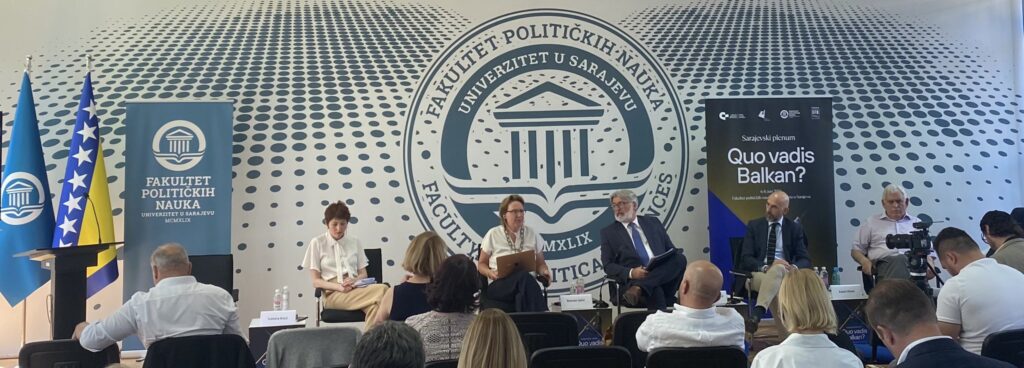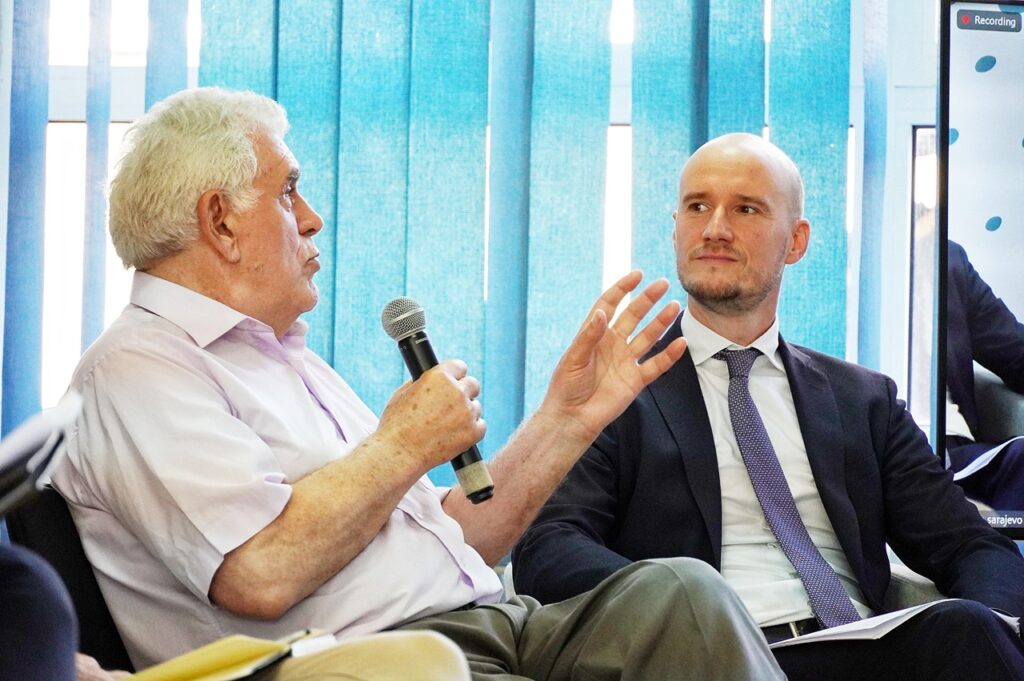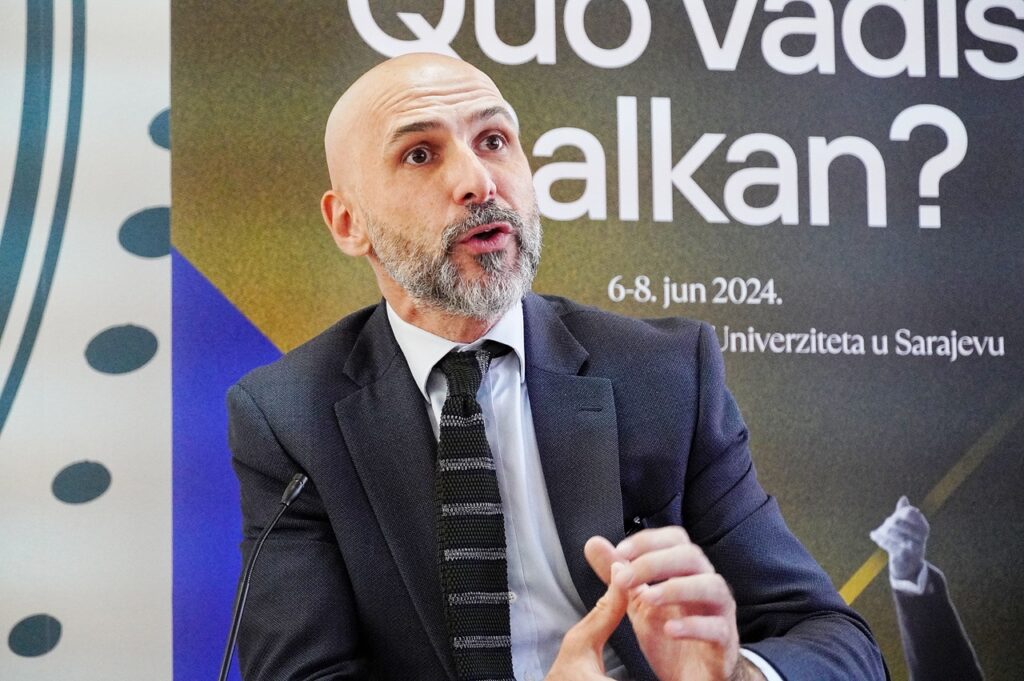The third panel of the Sarajevo Plenum was dedicated to the role of Serbia in the Western Balkans. Insights were provided by Azem Vlasi, politician and lawyer from Kosovo, Izabela Kisić, Executive director of the Helsinki Committee for human rights in Serbia, Branislav Radeljić, professor and consultant, Roman Jakič, politician from Slovenia, and Adelheid Woelfl, journalist from Austria. The panel was moderated by Balša Božović from the Regional Academy for Democratic Development (ADD).
‘’The bloody dissolution of Yugoslavia began with Slobodan Milošević’s regime in Kosovo. At that time, everyone turned a blind eye, thinking that Serbia had a problem with Kosovo and that it was not a Yugoslav issue”, stated Azem Vlasi. He reminded that this essentially marked the beginning of the conflict with the Greater Serbian policy, which was laid out in the SANU Memorandum of 1986 and continued in 1989 when Kosovo’s autonomy was forcibly revoked. Few recognized what was really happening, while most believed that Yugoslavia was being defended in Kosovo. ‘’Today, Kosovo is a state with functional institutions and has achieved its goals in this sense”, he emphasized. Vlasi pointed out that Kosovo has remained the focus of Serbian policy from Milošević to the present day. “In its Constitution, Serbia emphasizes Kosovo more than Vojvodina… Serbia is trying to make the Association of Serbian Municipalities a separate entity connected with the Serbian Government and does not want to close this issue with Kosovo’’, Vlasi stressed. Analyzing the idea of Open Balkans, he said that he believes it is Vučić’s idea, which Edi Rama naively fell for at first, and that he is deeply convinced that it is a Serbian-Russian project from which Rama quickly came out after realizing its nature.
“Power is the key term when we discuss states within regional relations. Whether it is a struggle for power, consolidation of power, or manifestation of power, but power is always at the centre of state actions, and Serbia is no exception in this sense,” said Branislav Radeljić. He stressed the importance of analyzing why the regime in Serbia receives support from the West, even though it is clear that it continuously seeks alternatives and does not commit clearly to EU membership.
Roman Jakič emphasized the importance of analyzing Serbia through the period before, during, and after the disintegration of Yugoslavia. “We must be aware that Yugoslavia did not break up because there were no solutions, but because all proposed solutions were rejected by Slobodan Milošević. What happened during the breakup of Yugoslavia needs no special explanation in Sarajevo, which experienced the longest siege in the history of warfare, averaging 329 shells per day, and in a country where genocide was committed,” he said. Jakič believes that Serbia needs a democratically oriented leader who would be a visionary, build bridges, and recognize European values, and that the absence of such leadership benefits Russia’s strengthening not only in Serbia but in the Western Balkans. “Russian influence is not limited to the classic meaning of the term, as it seeks to provoke various conflicts aimed at diverting attention from what Russia is doing,” he warned.
Adelheid Woelfl emphasized that since coming to power, Vučić has had the support of powerful parties from the international network of the EPP – the European People’s Party, to which his party belongs. “Many politicians in Europe thought that Edi Rama and Aleksandar Vučić would accelerate European integrations. Serbia was treated as a champion of European integration, although this was not true,” she recalled. She also pointed out that it is extremely dangerous that many have even accepted Vučić’s position that borders in the Balkans are subject to change and negotiable.
Izabela Kisić believes that Serbia is still trapped in the nationalism of the 1990s and that a debate like this one would be impossible at universities in Serbia. “This does not mean that students and younger generations are not interested. The UN Resolution on Srebrenica opened this topic in society. This Resolution is therefore extremely important, and it is necessary for the international community to insist on its implementation, especially in Serbia and the Republika Srpska,” she said. “Although the regime in Serbia declares that it is on the European path, it simultaneously emphasizes that geopolitical circumstances are a variable category, and it is clear that it behaves in accordance with this belief. And this policy cannot be tied to one person – neither to Milošević in the past nor to Vučić in the present,” Kisić noted. She highlighted that there is a creeping annexation of the Republika Srpska in Serbia, warning about the narrative that accompanies numerous events organized by the state, including the announced All-Serbian Assembly, and that developments in the upcoming period will depend on international circumstances. She said she fears that the real goal of the nationalist elites in Serbia is the Republika Srpska. Commenting on the creation of the Association of Serbian Municipalities, she believes that the Serbian government sees it as an opportunity to partition Kosovo and that she believes this is what it promised to the Kosovo Serbs, keeping them in a constant state of conflict.
The Sarajevo Plenum Quo Vadis, Balkan?, opened yesterday, is organized by the Regional Academy for Democratic Development (ADD) from Serbia, the Centre for Civic Education (CCE) from Montenegro, and the Faculty of Political Sciences of the University of Sarajevo (FPN US), with the support of the European Fund for the Balkans (EFB).



